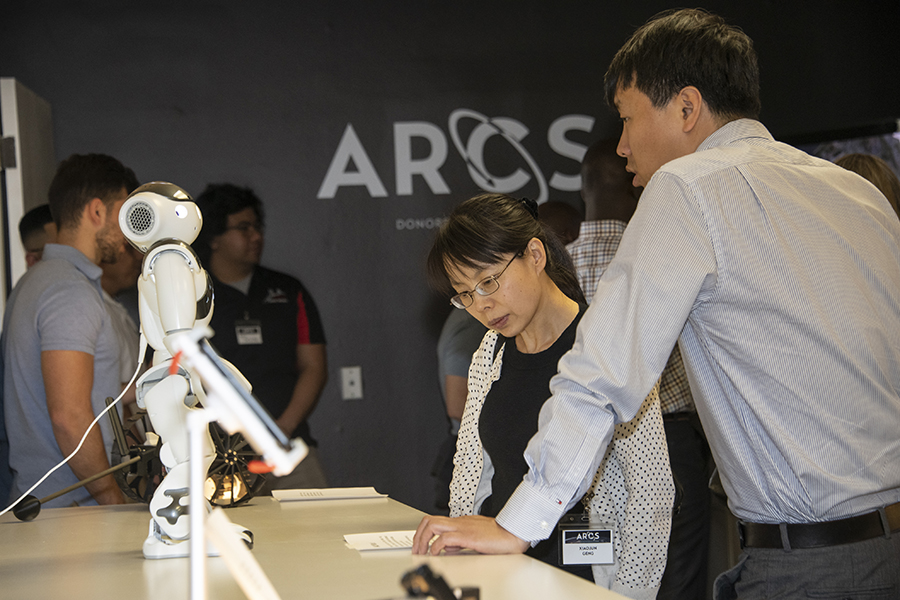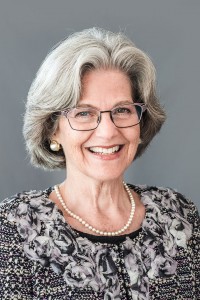Matador Parent, Volunteer Helps NASA ARCS Students Express Their Ideas Through Writing

ARCS faculty and electrical and computer engineering professor Xiaojun (Ashley) Geng (left) and manufacturing systems engineering and management professor Bingbing Li (right) explore the center’s open house in February 2020, which featured dozens of student projects. Photo by Lee Choo.
What is the value of the written word? What price can be placed on the ability of young professionals and researchers to express themselves clearly in writing — and communicate their ideas, their passions, to others?
To CSUN mechanical engineering professor Nhut Ho and CSUN Foundation Board member Honey Kessler Amado, that value is incalculable, priceless. With this in mind, Amado, the distinguished appellate law specialist, teamed up this spring to work with Ho to offer professional writing coaching to students in the new NASA-sponsored Autonomy Research Center for STEAHM (ARCS), which he directs.

Matador parent and CSUN Foundation Board member Honey Kessler Amado. Photo courtesy of Amado.
Amado, a Matador parent, longtime friend of CSUN and devoted volunteer, was introduced to CSUN’s College of Engineering and Computer Science in 2019, on a visit with the CSUN Foundation Board to see the students’ work. The work of the Matador engineering students captivated and inspired her.
“I was so wowed by what the [engineering students] were doing,” Amado said. “They’re doing amazing things! I could hardly understand a thing they were explaining, but I understood their excitement and the value of what they were exploring and trying.” She remembered reading years ago that writing could be a challenge for some scientists and engineers, she said.
This seemed to be the ideal time to teach students her approach to writing — as she was transitioning into retirement and would have time for teaching. Amado has worked as an appellate attorney since 1984 — an area of the law where clear, compelling and reasoned writing is paramount.
She contacted Robert Gunsalus, president of the CSUN Foundation and vice president for University Relations and Advancement, asking if she could offer writing workshops to CSUN students — similar to the workshops and webinars she’s taught for decades to law firms and attorneys, but tailored for undergraduates. Gunsalus introduced Amado to Reza Sayed, director of the Student Service Center/EOP at the College of Engineering and Computer Science, who communicated Amado’s offer to the engineering and science professors. Ho was the first to jump at the opportunity for his ARCS students.
“We envisioned this as a workshop, plus one-on-one coaching,” said Amado, who started the sessions in late April on Zoom, as students completed their classes remotely due to COVID-19. “I spent time getting to know the students, and how they approach research and writing.
“You can’t write well if you don’t think clearly,” she said. “You really have to think carefully about your topic and materials before you begin to write, so your writing reads in a way that makes sense.”
In several sessions, Amado reviewed grammar fundamentals, writing flow and tone, and best practices for organizing research papers, technical reports, thesis work and articles.
Amado was also impressed that ARCS is a center of excellence where students of all majors can participate in research into increasingly autonomous (IA) systems, with funding from NASA’s Minority Institutional Research Opportunity program and in collaboration with scientists from NASA’s Jet Propulsion Laboratory (JPL) and Armstrong Flight Research Center. Participating undergraduates and a master’s student include Matadors from underrepresented groups in STEAHM (science, technology, engineering, arts, humanities and mathematics), in disciplines across six of CSUN’s colleges.
“It’s a tremendous opportunity to learn from someone with such exemplary credentials and passion for writing,” Ho said. “To learn from someone like Honey — who has practical, professional and life experience — about how to communicate and express themselves is something the students need for life.
“This is a critical skill that all of the ARCS students that work across multiple disciplines with NASA can benefit from,” he said. “This coaching empowers the students to become better thinkers and writers, whether it’s for conference papers, technical reports or thesis papers.”
Amado and Ho had planned to hold the workshops in person on campus but had to pivot to Zoom. They started small in the spring, piloting the program with eight students. Amado continued some one-on-one coaching via Zoom, and she and Ho plan to expand the workshops in the fall.
“Honey Amado gave great insights and recommendations during our session at ARCS,” said David Perez, a master’s student in journalism. “As a grad student, I found her tips valuable, adding to my skillset as an academic.”
Amado, whose daughter Gabrielle graduated from CSUN with a degree in creative writing and whose son-in-law David is a business major at CSUN, loves language and the written word. She said, “I want [students] to hear the poetry and beauty of language.”
She knows that CSUN boasts a number of writing labs and tutoring resources, especially in the Learning Resource Center at the CSUN Library. But Amado said she was especially interested in working with science and engineering students. It was a way to touch their world, a world that sees the future so imaginatively and speaks in a language so different from her own. She hopes to give them tools to communicate in writing with laypeople like herself, she added.
“I know there’s a whole cadre of retirees out there with vast and varied skill sets,” she said. “I suspect that there are many alumni and professionals in the wider community who would be happy to share their knowledge and expertise and to work, [directly], with our CSUN students.”
To get involved and volunteer your time with CSUN, visit https://www.csun.edu/alumni/volunteer. To learn more about ARCS and CSUN’s interdisciplinary research with NASA, visit https://csun.edu/arcs.

 experience
experience